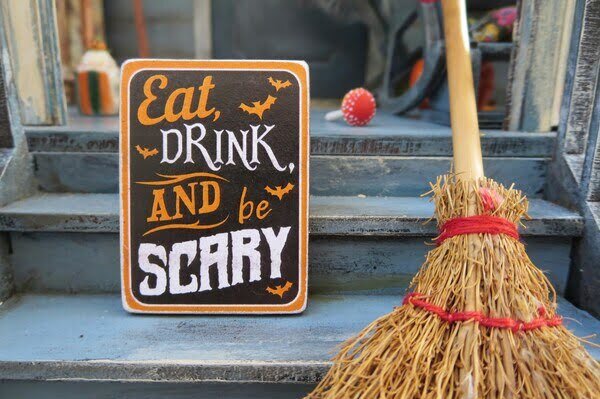10 Reasons You Over Eat… And How To Stop
Sure, it’s easy to say don’t eat when you’re not hungry, but let’s be honest, we’ve all dipped into the cookie jar, basket of chips or grazed at a buffet table at times when out stomachs are saying stop. So, what is it that makes you eat when you know you don’t really need it.
10 reasons you eat when you’re not hungry and what to do instead
Pay close attention to the reasons that sound familiar to you and make a plan to stop the behavior before it starts.
1. Boredom – It’s a Friday night and you’re in the house. You would rather be doing anything other than watching television on a Friday evening. As you flip through the channels you decide to catch up on reality TV or the latest murder mystery. You find yourself wanting a snack to go with your television watching experience. Are you really hungry? Probably not. What’s more likely is that you’re bored and eating gives you a feeling of “doing” something other than being bored. If you notice that you reach for food when you’re bored, plan more activities to keep you occupied. If you happen to be home at times when you’d rather be out, don’t beat yourself up about it. Take advantage of that time to read a good book, catch up on cleaning or even gain a few extra winks of sleep.
2. When there’s one… Ever notice how easy it is to eat when you see others doing the same? Next time you are at a party or other function where food is readily available, take note of how your eating habits may change in that environment. If you realize that you eat more when other eat, make a plan. Making sure you’re full before going to an event with food, taking healthy snacks with you and other tools will help you eat less around others. If you’re truly hungry, then eat. If not, make a plan to avoid the food table and mingle a bit more so take your mind off of food.
3. It’s right there in front of you – Sometimes you’ll want to eat just because the is food in front of you. Many of us may have grown up with parents and other relatives that did not allow you to “waste” food. If it was there, you were expected to eat it. Good thing is now that you’re an adult and you have the choice on what you want to eat and if you want to eat. You can make our own decisions about our hungry levels and stay true to healthy eating. When you find yourself in situations where you know food will be present, the best line of defense is out of sight, out of mind. Don’t place yourself in front of food. The temptation may be too great to resist. Instead, follow the law of excuse and remove. Politely excuse yourself from the food table and remove yourself to another area.
4. Comfort food – Emotions can make people very prone to eat when they’re not hungry. But, relying on food to quell your emotions does nothing to address the real issue. Routinely using food won’t solve the problem and it will cause more problems in the form of weight gain. Getting to the the bottom of what is making you experience certain emotions is better than turning to food. A great way to track potential emotional eating is to use a food journal. Each time you find yourself reaching for food when you’re not hungry, take note of what you’re feeling in the moment, write it down and over the course of a month see what emotions you are feeding. Then address the emotion.
5. Everybody is doing it – Special occasions usually mean family, friends and food. Nothing is better than celebrating a new baby, marriage, graduation and other life moments that food. And while it’s great to enjoy time with your family and friends, food need not be the star of the show. There’s no need to skip out on the fun in order to avoid the food. Make sure you bring along some healthy alternatives or, when possible, preview the menu ahead of time and make a entree selection before you get to the restaurant. That’s the best way to maintain your diet while enjoying the celebration.
6. Free food – I know… it seems like such a good deal, right? However, just because it’s free of cost doesn’t mean it’s free of calories or consequences. When you’re in a situation where free food sounds too good to pass on, wait about 15 minutes before jumping at the chance. If after 15 minutes you still want to eat, then you’re truly hungry and should do so. If not, then pass. A good deal doesn’t come around often, but in the case of food, it’s better not to indulge if that means you’ll have to spend extra time in the gym working off your meal.
7. Food pushers – My family is notorious for trying to get me to eat more, can you relate? I find that I can detract attention from what I’m eating at family gathering by being really helpful in cleaning up the meal. Once I’m on the move and putting food away, no one notices that I didn’t get a heaping second helping. Â Who are your food pushers? Friends? Co-workers? Another solution to gatherings with notorious food pushers is to bring your own healthy dish to share. That way, even if you don’t feel like you can get away from your food pushers, you can ‘be pushed’ into a healthy meal on your own terms.
8. You’re out of energy – When you haven’t had enough sleep, you may confuse hunger for actually being tired. During the day, that 3pm hour can wreck havoc on your diet. Stock up on sleep and healthy snacks to get you through the day. Some other alternatives to eating when you’re tired is to take a walk, stretch or drink water. You can never go wrong with any of those ideas.
9. The clock strike food – When the clock strikes 9am, 12pm, 3pm or 6pm, your brain may tell you it’s time to eat. But, if it doesn’t then don’t eat. Just because other people eat at certain times doesn’t mean you have to follow suit. Eat when you’re hungry and not when the clock says it’s time. A good rule of thumb is to eat every few hours.
10. Clear the plate guilt – As mentioned above, some people suffer from thinking that they have to clean their plates. It’s usually a hold over notion from childhood when you were told to eat everything and not waste anything. Some great things about adulthood include driving, making your own decisions and knowing when to say when…you’re hungry that is! A great way to eat less is to prepare your food on smaller plates. And if you find that you’re leaving food on your plate, consider it leftovers for another day. Or, allow yourself to throw it away and not be saddled by guilt that you weren’t that hungry.
Curbing the urge to munch when you’re not hungry is an important way to control your diet. If you see something that resonates above, make a conscious effort to change that and watch your waistline thank you in spades.








